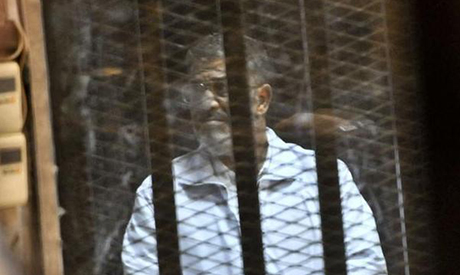
Egypt's ousted President Mohammed Morsi stands inside a glassed-in defendant's cage during his trial on charges related to the prison breaks at the height of the 18-day 2011 uprising against his predecessor Hosni Mubarak, Jan. 28, 2014 (AP Photo)
Former president Mohamed Morsi defended himself in court on Sunday for the first time since his ouster, claiming he was innocent of charges of espionage and asserting that he was still Egypt’s president.
"I am still the legitimate president of the country, who came (to power) through fair elections," he stated to the Cairo Criminal Court.
Morsi, who was ousted in July 2013, took the opportunity to reiterate the argument frequently repeated by his allies, describing his deposal as a "coup d'état.”
Morsi was removed after mass protests nationwide against his rule. He was immediately detained, initially in a secret location, and subsequently charged with a variety of crimes including espionage and inciting murder.
Speaking for two hours at his trial for espionage, Morsi recalled the moment when he was arrested by the head of the presidential guard, Mohamed Zaki.
"I told him, 'Are you crazy? You take your orders from me,’ " said the former president.
Morsi and 35 others are on trial on charges of collaborating with foreign organisations – namely Gaza rulers Hamas, an ideological offshoot of the Brotherhood – to commit acts of terrorism in Egypt.
Morsi denied the charges, stressing that a fact-finding report that was issued during his presidency in 2012 upon his request showed that a "sovereign entity" affiliated with "the coup leader" was involved in the Battle of the Camel, a name given to deadly clashes that took place during the 18-day uprising.
He said that, according to the testimonies of workers at hotels overlooking Tahrir Square, where the clashes took place, those who were on the roofs had identification cards belonging to that entity.
Egypt's incumbent president Abdel-Fattah El-Sisi was head of military intelligence at the time.
Morsi also refused to acknowledge the authority of the court trying him. "You are not my judges and this is not my trial," he said. He did however express respect for the judiciary in his remarks.
Morsi claimed that one reason why he was ousted was that the Islamist-majority parliament and the government led by Kamal El-Ganzouri, a prominent Mubarak-era figure, were at loggerheads.
"El-Ganzouri once told [Parliamentary speaker Saad] El-Katatni… 'an appeal lodged in the drawer of the constitutional court would dissolve it (Parliament)," he said.
The parliament's lower house was dissolved in 2012 due to a court verdict of unconstitutionality in the electoral process which formed it. The upper house was dissolved in 2013 as part of the roadmap which replaced Morsi's rule.
The court adjourned the case to 21 January.
Short link: